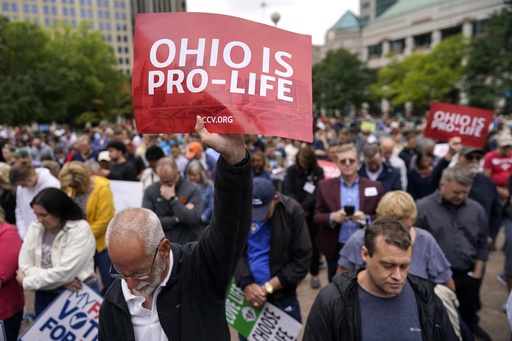
COLUMBUS, Ohio — A recent ruling from an Ohio judge has permanently blocked a law mandating the cremation or burial of fetal or embryonic remains following surgical abortions. This decision is based on the constitutional amendment that Ohio voters approved in 2023, which protects reproductive rights.
Judge Alison Hatheway of Hamilton County rendered her verdict in a case initiated by multiple clinics in collaboration with the ACLU of Ohio. The initial legal challenge raised concerns regarding the absence of clear guidelines, leading challengers to claim that fulfilling the law’s requirements was “impossible.” The law, which was enacted in 2020, sought to modify previous Ohio legislation requiring that aborted fetuses be disposed of “in a humane manner” without a clear definition of what constituted “humane.”
Supporters of the law claimed it would ensure dignity for the remains of aborted fetuses, while opponents argued it was merely a tactic by the Republican-led legislature to obstruct access to a legally permitted medical procedure. Judge Hatheway stated, “If S.B. 27 were allowed to go into effect, it would severely impede access to abortion resulting in delayed or denied health care.” She highlighted the state’s lack of robust arguments in an attempt to defend the law’s enactment, asserting that it “simply does nothing to serve patient health.”
The judge dismissed the state’s position that the law would solely impact fetal tissue and not access to abortion services. She pointed out that the law required healthcare providers to inform individuals seeking abortions about this requirement prior to the procedure, along with a stipulation for providers to establish connections with crematory services and funeral homes that were not already in place.
This ruling concludes a legal battle that began in 2021, with clinics and ACLU representatives contesting that the law constituted an unconstitutional barrier to women’s lawful right to an abortion, branding it as “frivolous and medically unnecessary.”
The backdrop of this legal challenge shifted dramatically in 2022 when the U.S. Supreme Court dismantled the 1973 Roe v. Wade ruling, which previously safeguarded abortion rights. This judicial change sparked a series of conflicts across the states, including Ohio, which sought to enshrine the right to abortion within their state constitutions.
As per the latest ruling, remains from surgical abortions will revert to being handled under Ohio’s established procedures for infectious waste, allowing them to be disposed of alongside materials from other medical operations.
Jessie Hill, an attorney cooperating with the ACLU, expressed relief that the ruling is now finalized, enabling healthcare providers to concentrate on delivering essential services. She hailed the decision as further affirmation of the strength of Ohio’s newly adopted Reproductive Freedom Amendment.
Kellie Copeland, director of the pro-abortion rights organization Abortion Forward, also commended the court’s decision. She remarked that the law was less about providing options for those seeking abortions and more about “discriminating against and shaming patients who choose to have an abortion and the medical professionals who provide abortion care.”
In December 2020, Ohio Governor Mike DeWine signed the measure concerning fetal tissue into law. At the time, supporters like Ohio Right to Life President Michael Gonidakis argued it was imperative to treat “the broken bodies of abortion victims” with respect.
This case represents just one of several abortion-related laws in Ohio that have faced legal challenges in light of the 2023 amendment. In August, Judge David C. Young temporarily halted multiple laws that collectively imposed a 24-hour waiting period on abortion procedures. In September, Judge Hatheway struck down two additional laws: one regulating the use of telemedicine for medication abortions and another barring non-physicians from prescribing the mifepristone abortion pill.
Additionally, in October, Judge Christian Jenkins invalidated Ohio’s most stringent abortion law, which prohibited most abortions once cardiac activity is detected—often as early as six weeks into pregnancy, potentially before a woman is even aware she is pregnant. All of these judicial decisions are currently under challenge.

